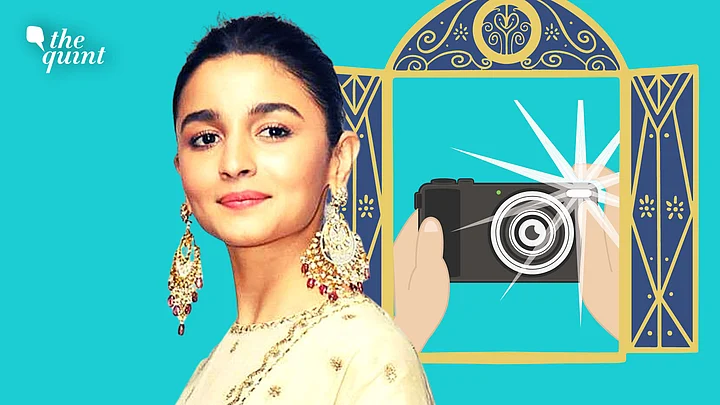It was a "perfectly normal afternoon." Alia Bhatt, 29, a famous Bollywood actor, was sitting in the living room of her home in Mumbai – which she shares with her husband and three-month old daughter – when suddenly she felt as if she was being watched.
"I looked up and saw two men on the terrace of the neighbouring building with a camera right at me," she recounted in an Instagram story, tagging the Mumbai Police.
"In what world is this okay and is this allowed?" Bhatt asked, dubbing the incident a "gross invasion of someone’s privacy".
And she isn't wrong.
Right to privacy is a fundamental right under Article 21 of the Indian Constitution. Recent apex court judgments also suggest that any privacy-related law has horizontal application, which means that it can be claimed against both state and non-state actors.
But does India have a comprehensive privacy law? Not quite.
Speaking to The Quint, Anumeha Mishra, Professor of Constitution Law at Delhi University, explained:
"India does not have a comprehensive privacy law. Especially when it comes to whether individuals can click your photograph or not. For example: in the US, different states have different standards for consent – either two party or one party. India has absolutely no such framework, especially on specific points that touch upon privacy."
But Mishra added that the apex court's Puttaswamy judgment (which declared right to privacy a fundamental right) said that privacy has a horizontal dimension also.
"This means that privacy laws or right to privacy should be read, under part III of the constitution, as being applicable also against private entities."
Essentially, what this entails is that the problem of infringing upon right to privacy does not end with the government alone. Even non-state actors, ie those who are not acting on behalf of the government, have a constitutional duty to uphold the right to privacy of other people.
"There is another important judgment: Kaushal Kishor v State of UP, which has in a manner accepted that there should be a horizontal application of rights and we should expand the scope of fundamental rights to regulate at least some of the private entities," Mishra added.
In this judgment, a constitution bench of the apex court, by a 4:1 majority, held that the fundamental rights under Articles 19 and 21 can be enforced even against persons other than the State. In doing so, the bench placed reliance on the (above-mentioned) Puttaswamy judgment.
But what is the situation in India presently like?
"Given these recent observations and because now private actors are also able to influence your rights, it is very important that we shed our previous understanding (which limited the spectre of rights to the dimension of the State)," Mishra added.
In India, a legal remedy is available for protecting personality rights.
These personality rights emanate from Article 21 of the Constitution, under right to life and dignity including privacy and publicity, and were enforced recently by the Delhi High Court in Amitabh Bachchan v Rajat Nagi & Others. In this, the Delhi High Court passed an ex parte ad-interim injunction restraining the defendants from infringing Bachchan's personality rights by misusing his name, voice, image and any other attributes for commercial use.
But such rights place greater reliance on the commercial value of a celebrity's personality than on their inherent right to privacy.
They focus more on the prevention of exploitation of a famous person's commercial success for advertisement, endorsement etc sans consent, and the protection of their financial interests. Thus, the pressing need for a statutory framework against the threat of being photographed by strangers as you go about your day-to-day business, continues to simmer in the shadows.
So what must be done now?
"Self regulation by the media is the best way," Mishra reckons.
"Media bodies should themselves regulate and adhere a code of conduct, rather than wait for a law to be made to check such instances."
And why is that so?
"Because if a law is made then the state will obviously try to limit your (a reporter’s) free speech, and it can be employed in other ways. So laws should be the last resort."Anumeha Mishra
And it is true that the press in India is presently caught in a tricky marshland between the devil and the deep blue sea – between an apparent increase in threats to press-freedom and a spike in prima facie unethical journalism – both of which have also, from time to time, invited the displeasure of the apex court.
Thus, Mishra opines that self-regulation is the way to go, adding: "There should be a self regulatory mechanism and a code of conduct which incorporates consent and privacy, and all the employees should be sensitised."
"If they start regulating themselves, then we won’t even have to resort to the law."
But who does the buck stop with?
"The organisation publishing the content is responsible at the end. These individuals (who take pictures without the consent of the person being photographed) are just employees. There is a need for the media organisation to act responsibly,"Anumeha Mishra
Thus, the need of the hour is for the platforms publishing such content for mere clicks and views to get their act together. In a country plagued with rampant unemployment, inching towards an economic recession, it may be unfair to expect mere photographers, who are just trying to earn a living, to know better. Especially if they are being encouraged by their paymasters to act in a certain manner.
The age of social media, marked with camera-phones and drones and clickbait, encourages privacy violations. But in the absence of a law that recognises the rights of individuals, when it comes to surveillance and consent, there is a requirement from large media-houses to introspect and incorporate a more conscientious approach towards commissioning and publishing content.
As pointed out by Mishra: "what an individual photographer does is just a symptom of the problem.”
